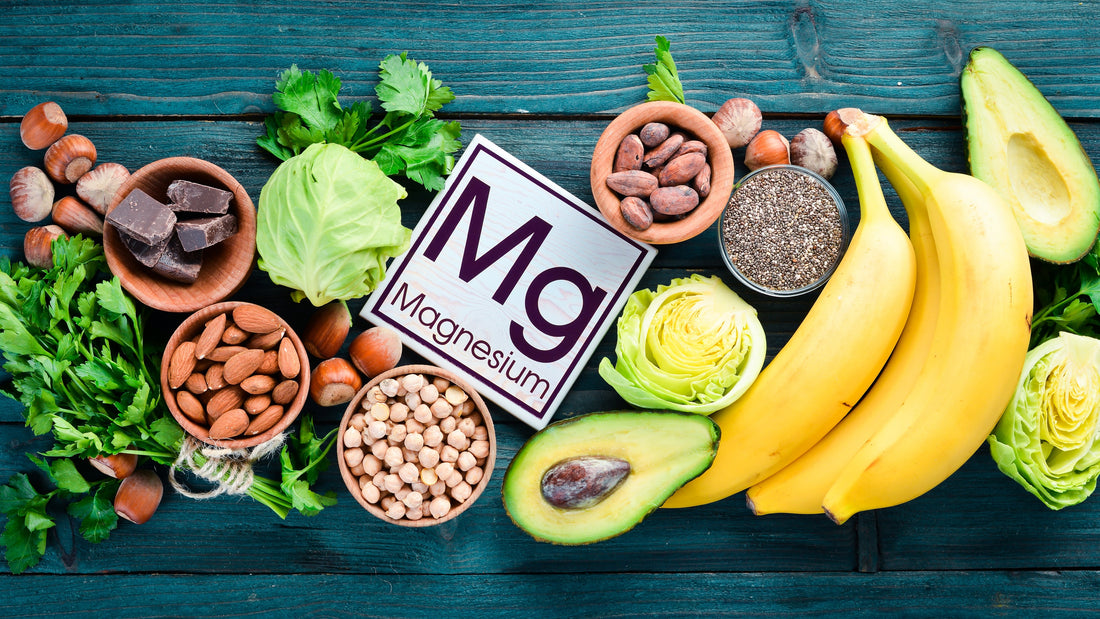Magnesium is crucial to the body’s healthy functioning. In fact, it affects everything from cardiovascular health to bone strength, leading many in the supplement world to consider it a mineral juggernaut. According to the National Institutes of Health (NIH), magnesium plays a role in over 300 diverse biological functions – a lot of work for a single mineral.
Because of its widespread significance, it’s important you’re getting enough magnesium from your diet to support all of your different biological systems. In fact, magnesium deficiency may cause things like muscle cramps or even coronary spasms.1 Many people in the United States, however, might not be getting their daily recommended amounts of magnesium. Processed foods, which are now a staple of American diets, often remove valuable nutrients like magnesium.2 Soil depletion and certain medications may also lead to magnesium deficiencies. According to recent data from a National Health and Nutrition Examination Survey, as many as 48% of Americans consume less magnesium than the estimated average requirement.3
Here are four ways healthy magnesium levels support your body:

1. Stress
In our modern world, it can often feel like there’s no shortage of stressors. Occasional stress can put strain on your relationships, making things more difficult in your work and home life. If you’re feeling occasional stress, low magnesium levels could be part of the problem.* A recent scientific review noted that, “a relationship between magnesium and anxiety is evident in humans.” 4
One of magnesium’s roles in the body is to help regulate activity in the hypothalamic pituitary adrenal axis (science talk for the part of your brain that controls your stress response system).4 One small study found that acute anxiety was linked to magnesium excretion,5 and some animal studies even suggest an inverse relationship between magnesium and anxiety.6
If you’re looking to add some calm to your life, making sure you’re getting enough magnesium may be something to consider.*

2. Cardiovascular Health
As one of your hardest working muscles, your heart may be in more need of magnesium than the rest of your body. The heart works by means of chemical reactions within your heart cells. As calcium is absorbed by the heart cells, it causes the heart to contract; magnesium then blocks the effects of calcium, allowing your heart to relax.7 This process is called systole and diastole.
Because of its role in the heart’s function, maintaining healthy magnesium levels may be important for heart health. According to a recent review, magnesium deficiency is correlated with an increased risk of heart problems.8 Magnesium deficiency is also commonly found in patients with congestive heart failure,8 more evidence for the importance of magnesium.*

3. Stamina
Magnesium plays a critical role in energy metabolization. By binding with ATP, it forms an Mg-ATP complex, a primary energy source.9 Similar to its function in the heart, magnesium affects how your muscles contract and relax. A comprehensive review of animal and human studies have suggested a link between magnesium deficiency and muscle cramps.10,11
If you’re an athlete, it may be harder and more important to maintain healthy magnesium levels. Because it’s likely your magnesium demand increases during exercise, physically active individuals might require more magnesium9 in order to maintain optimal athletic performance. For athletes, low magnesium levels could result in lower energy levels and increased oxygen demands.12 So making sure you’re getting enough magnesium could help improve your stamina. *

4. Bone Health
When it comes to bone health, calcium and vitamin D tend to get all the attention. But magnesium may be important to things like bone density and bone formation.
According to the NIH, several population-based studies have shown a positive association between magnesium levels and bone density.14 So proper magnesium levels could play an important role in supporting your bone health.*

Add Magnesium To Your Diet
Looking to add more magnesium to your diet? It could be as simple as eating a well-rounded diet. Magnesium-rich foods are easy to find in any grocery store if you know what to look for. According to the federal government’s Dietary Guidelines for Americans, vegetables and whole grains are good sources of magnesium and other healthy nutrients. Nuts, avocados and even dark chocolate are also good sources of magnesium.15
With a wide range of magnesium supplements, KAL is here to help you on your journey to a healthier life.

Tap Into Your Best Self
The bottom line is that magnesium affects your body in lots of different ways, and many Americans aren’t getting enough. Whether you’re looking to address a particular concern, or you’re just trying to support overall health, magnesium could be the place to start. It may be worth adjusting your diet to include more magnesium-rich foods, or using magnesium supplements to help meet your recommended daily amounts.*




